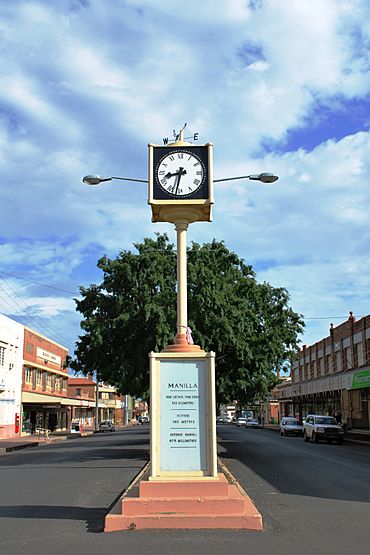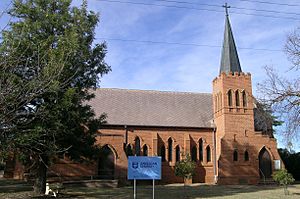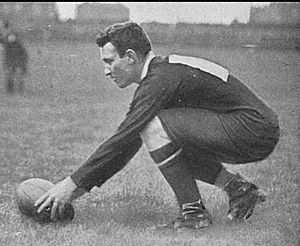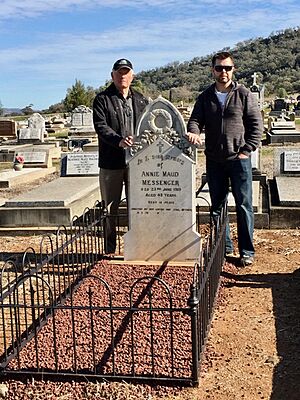Manilla, New South Wales facts for kids
Quick facts for kids ManillaNew South Wales |
|
|---|---|

Clock tower in the main street
|
|
| Population | 2,386 (2021 census) |
| Elevation | 357 m (1,171 ft) |
| Location | |
| LGA(s) | Tamworth Regional Council |
| County | Darling |
| State electorate(s) | Tamworth |
| Federal Division(s) | New England |
Manilla is a friendly town in New South Wales, Australia. It is located on Fossickers Way, about 45 kilometres (28 miles) northwest of Tamworth. Manilla is known for its great spots for fishing, paragliding, and mountain biking. The town's name comes from the Gamilaraay word 'Maneela'. This word means 'meeting of the rivers', which makes sense because Manilla is where two rivers meet!
The town of Manilla started in 1853. It was built where the Namoi River and the Manilla River join together. Manilla used to be the main town for the Manilla Shire local government area. But in 2004, it became part of the Tamworth Regional Council. The town is also close to the Bundarra-Barraba Important Bird Area. This area is very important for protecting the critically endangered regent honeyeater, a special bird. Manilla is also famous for Split Rock Dam on the Manilla River and Lake Keepit on the Namoi River.
Contents
Public Facilities in Manilla
Manilla has several useful public places for its residents and visitors:
- Police Station
- Post Office
- Swimming Pool
- Sportsground
- Tennis Courts
- War Memorial Hall, Library and Pre-School
Getting Around Manilla
You can get to Manilla by bus. Tamworth Buslines offers a route, number 443, that travels from Tamworth to Manilla.
Manilla's Past: A Brief History
The area where the Manilla and Namoi Rivers meet was called 'Maneela'. For many years, it was a popular camping spot for the local Indigenous people. They were part of the large Kamilaroi (Gamilaraay) tribes of northwestern New South Wales.
Early European Exploration
In 1827, Thomas Florance led the first British group to explore this region. Later, in 1832, Henry Dangar and Sir William Edward Parry also explored the area. They camped where Manilla town is now and saw several Aboriginal families living there.
Around 1836, British settlers, known as squatters, arrived. They wanted to set up large sheep and cattle farms on land that was not officially owned. Three big farms were started near Manilla: Greenhatches, Dinawirindi, and Cuerindi.
Town's Beginnings and Growth
In the 1850s, people used bullock wagons to move goods through the Manilla area. They often had to wait at the river junction when the water was high. In 1853, George Veness set up a store and wine shop there. This was the start of the Manilla township. The town grew quickly because of its successful wheat and farming industries.
In 1864, a huge flood almost destroyed the new town. It took many years for Manilla to recover. The first school was built in 1878, and the first post office opened in 1880.
Manilla in Music
Australian singer-songwriter Darren Hanlon wrote a song called 'Manilla NSW'. It was released in 2006 on his album 'Fingertips and Mountaintops'.
Rugby League and Dally Messenger
In July 1917, famous rugby player Dally Messenger and his wife, Annie, took over the Royal Hotel in Manilla. Soon after arriving, Dally started the Manilla Rugby League Club. This was a challenge because many young men were away fighting in World War I.
Dally played some games, but his main focus was coaching the local young men. In 1918, his team won a competition in Tamworth. They beat Quirindi 10-6 and Tamworth 14-nil.
In June 1919, Dally and Annie both got the Spanish flu. Dally got better, but sadly Annie passed away on June 23, 1919. She is buried in the Manilla cemetery. Dally returned to Sydney with his five-year-old son in August 1919.
On July 8, 2017, the Manilla Rugby League club celebrated its 100th anniversary. They played a tough game against the Bendemeer Mountain Men and won 34-30. Dally Messenger's grandsons and great-grandchildren were special guests at the celebration dinner.
Heritage Sites
Manilla has some places that are important for their history. These are called heritage-listed sites. One example is:
- Tamworth-Barraba railway: Manilla railway underbridges
Aviation Sports in Manilla
Manilla has become famous worldwide for air sports. It's a great place for hang gliding, paragliding, ultralight aircraft, gyrocopters, and gliders. Nearby Mt Borah is one of the best places in the world to launch paragliders and hang gliders.
In 1998, Godfrey Wenness, a local paragliding instructor, set a world distance record. He flew 335 kilometres (208 miles) on a paraglider! Big flying competitions happen in Manilla every summer. The 10th FAI Paragliding World Championships were held there in 2007. About 150 pilots from 41 countries took part.
Before that event, Manilla was in the news worldwide. A paraglider pilot named Ewa Wiśnierska from Germany survived being pulled up into a thunderstorm to 9,946 metres (32,631 feet). Her amazing story was made into a TV show called Miracle in the Storm.
Famous People from Manilla
Manilla has been home to several notable individuals:
- Henry Burrell (1873–1945): A naturalist who studied the platypus.
- Stan Coster (1930–1997): A well-known Australian country music singer-songwriter.
- Tracy Coster: An Australian country music artist and Stan Coster's daughter.
- Fiona Coote: At 14, in 1984, she became Australia's second and youngest heart transplant patient.
- Anna Henderson: An ABC News journalist.
- Gavin Coote: An ABC News journalist.
- Dally Messenger (1883–1959): A famous rugby league and rugby union player. He lived in Manilla from 1917 to 1919.
- Rod Coote: An Australian indie-pop music singer-songwriter.
- Harry M. Miller: An entrepreneur who bought a property near Manilla in the 1970s.
- John Quayle: A former CEO of Australian rugby league, who started playing rugby in Manilla as a boy.
- Anne Rouen: An author who writes historical fiction.
- Godfrey Wenness ASM (born 1967): A paragliding pilot and instructor who developed the Mt Borah air sports facility. He holds a Guinness World Record for the longest paraglider flight (335 km) in 1998.
 | Sharif Bey |
 | Hale Woodruff |
 | Richmond Barthé |
 | Purvis Young |





